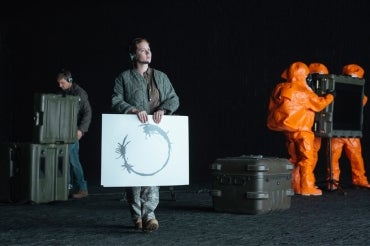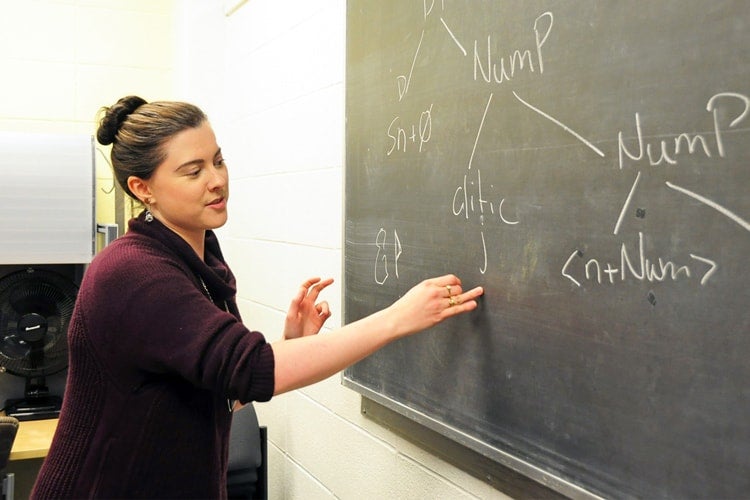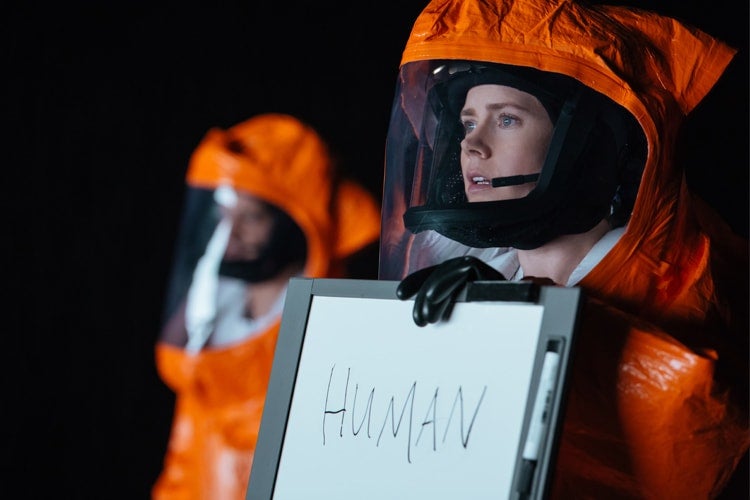Communicating with aliens? U of T linguists talk facts behind the film 'Arrival'

Published: November 25, 2016
Arrival, Canadian director Denis Villeneuve’s latest film, isn’t your typical sci-fi epic – nor is its protagonist.
The unlikely star of the critically acclaimed film is a linguist named Louise Banks, who is played by Amy Adams. Banks is approached by the U.S. government to decipher an alien language after mysterious UFOs land in different parts of the world.
Arrival continues the recent trend of sci-fi filmmakers consulting with real-life experts to ensure that scientific, and in this case, linguistic elements of the story are as accurate as they can be.
So does the film get it right? We asked U of T linguists.
“There's recognition that suspension of disbelief is actually easier if the writers do their homework,” says Nicholas Welch, assistant professor in the department of linguistics in the Faculty of Arts & Science.
Films and TV shows like Game of Thrones, Avatar and Star Trek have employed linguists to design languages unique to the fictional worlds, he says.
Welch specializes in syntax and morphology of languages – how words and sentences are put together to create meaning. His focus is on the Dene languages spoken by Indigenous people in North America.
“There are a number of features of these languages that are different from most of the languages that are widely spoken in the world,” he says.
“Studying these languages gives us a hint of what it might be like to listen to and look at a language that's radically different from everything we've seen before, which of course any non-human language would inevitably be.”
U of T linguistics PhD student Shayna Gardiner says the key to deciphering a new language is trying to find similarities with existing ones. Her expertise is in ancient Egyptian language and writing.
“When [Jean-François] Champollion was deciphering hieroglyphic from the Rosetta Stone, he had to figure out what kind of system it was,” she says.

PhD student Shayna Gardiner says linguistics is a lot like math (photo by Romi Levine)
Gardiner hypothesizes that in the case of the alien species in Arrival, their language is most similar to Chinese writing in that one character can represent a whole word.
“What [Banks] does is figure out which word is which character, and then she figures out sentences when you string the characters together. Then you can recognize what they're trying to say in writing based on which characters they're using,” she says.
In the film, Banks slowly introduces words to the aliens – called “heptapods” – first starting with nouns, then introducing verbs and eventually more complex sentence structures.
Gardiner says this is exactly how linguists would tackle learning a new language.
“Linguistics is really math with words…you have to look at it like a puzzle, and you're solving this mathematical puzzle to figure out what the language is doing, what it's capable of doing and how its sentences are structured,” she says.
But without the shared context of being human, translating an alien language would be much more complex, says Welch.
“The whole effort would be radically more difficult, and there would be no guarantee that the concepts we consider basic would be the same ones that an alien species would consider basic,” he says.
On the off-chance that they're ever contacted to participate in a top-secret mission to communicate with aliens, both Gardiner and Welch say they would not hesitate.
“Oh totally. That would be so cool. It would be so much fun to interact with a new language that nobody knows how it works. It would be such a good puzzle to solve. If you're a linguist, you always want to solve language puzzles,” says Gardiner.
Welch says any linguist would jump at the chance. “It would be an enormous challenge, an enormous opportunity, potentially a heck of a lot of fun, but of course it would be really daunting,” Welch says.
For now, at least Arrival is generating interest in the discipline, says Gardiner.
“As long as more people are into linguistics and want to know more about it because of this movie and other movies where they consult linguists, I'm super happy.”

Louise Banks, played by Amy Adams, attempts to communicate with aliens, first by introducing simple nouns (photo by Jan Thijs/Paramount Pictures)



